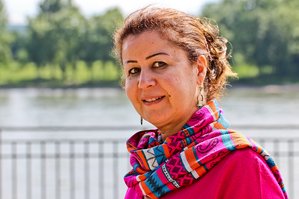Prof. Dr. Amel Grami
Universität Manouba
Curriculum Vitae
Amel Grami studierte Arabische Literatur und Geschichte an der Universität Tunis, wo sie 1993 mit der Dissertation „Apostasy in Islamic Thought“ promoviert wurde. 2004 erhielt sie für ihre Arbeit „Difference in Islamic Culture“ den Doctorat d’Etat der Universität Manouba. Seit 1993 forscht und lehrt Amel Grami an der Faculté des Lettres, des Arts et des Humanités der Universität Manouba, wo sie 2005 zur Professorin für Arabistik berufen wurde. Prof. Grami gehört zu den weltweit renommiertesten WissenschaftlerInnen, die im Kontext der Religionswissenschaften und der Frauen- und Geschlechterstudien forschen. Sie erbrachte zahlreiche Beiträge zu internationalen Konferenzen und Expertenrunden und leitet die Groupe de traduction de la production tunisienne dans les champs de la pensée et de la civilisation im tunesischen Nationalen Zentrum für Übersetzung. Ihre Forschungsgebiete umfassen Islamwissenschaften sowie Gender-Studien (mit besonderem Fokus auf Maghreb), vergleichende Religionswissenschaften und den Dialog zwischen Religionen und Kulturen. Zu ihren Forschungsinteressen gehören Reformbewegungen im Mittleren Osten sowie die neuen Reformer in Tunesien. Amel Grami ist Mitglied verschiedener Dialogs- und Forschungsgruppen zu medialen Religionsdiskursen und der Association of Muslim Women Lawyers for Human Rights. Unter ihren Publikationen finden sich zahlreiche Studien und Artikel zum Themengebiet „Die Stimme der Frauen“, Gender-Analysen arabischer Medien sowie Arbeiten zum Gebiet der Menschenrechte mit besonderem Fokus auf dem Einfluss der (neuen) Medien. Prof. Grami war von Mai bis August 2014 Fellow am Käte Hamburger Kolleg „Recht als Kultur“.
Forschungsprojekt
The Debate on Law, Religion, and Gender in Post-Revolution Tunisia: Emerging and Inherited Cultural Patterns
In a society transitioning to democracy from an authoritarian regime, drafting a new constitution is an important step in the establishment of a civil and democratic state. Indeed, the demand of Tunisians to write a new constitution reflects their ambitions, aspirations and hopes; but reality shows a huge gap between the expectations of the majority of Tunisians and the result of the drafting process.
The Tunisian transition is characterized by a fierce debate between the secular and the religious forces. This unfolding confrontation forms the backdrop to the process of drafting a new constitution, amid anxiety surrounding the role of law, the place of Islam in the new political system and the gender relationship.
However, fears of the resurrection of a new theocratic dictatorship are mitigated by a dynamic civil society in which voices that were silenced , invisible or misused by the former regime of Zine al-Abidine Ben Ali are becoming distinctly vocal. Their action has become increasingly visible evolving around the place of law, religion, and gender in the new Constitutional framework. The debate has been so far marked by constant clashes between not only ideologies but inherited and emerging cultural patterns some of which have become part of the local socio-cultural landscape reflected namely in dress, the arts and debates on the place of women in society and politics.
Thus, the research aims are the following:
- to study the relationship between law and culture as reflected in the debate inside the Constituent Assembly and the media (religion, gender relationships, politics...) in post-revolution Tunisian society.
- to examine different meanings of the Constitution
- to explore the culture of resistance (women, minorities, secularists, youth...) in a context of dominance of political Islam and the re-emergence of patriarchal culture. What strategies are used in order to counter the quest to impose old cultural models?
- to show that men's perceptions of women's rights and how they respond to the demands of women rights activists are embedded in a heavy cultural heritage of male domination and religious perception of gender roles (discourses and acts).
- to examine lexical and grammatical expressions that encode gender in the Constitution, the ideological positions evident in these expressions, and their impact on gender parity and socio-political equality and how they reflect a project to re-establish the foundations of a conservative Islamic culture and rule.
- to analyze how arguments made for and against inclusion of a reference to Islamic law ('Sharia') in the different draft (4 drafts) of the constitution also reflect the emerging culture of radical conservatism.
- to show how political leaders, parties and civil society actors are not only bearers of political agendas but also of different socio-cultural projects, inherited from Tunisia's past, immediate environment and regional influence; namely an interregnum moment reflected in the social environments' many visible signs of an inevitable clash between inherited and emerging patterns (dress, action, social projects, customs and traditions).
Publikationen (Auswahl)
- Apostasy in Modern Islamic Thought, Dar al Janub, Tunis 1996 (Arabisch).
- Is There Religious Freedom in Islam?, fennec, Marokko 1997 (Arabisch).
- Islam in Asia, Dar Al talia, Beirut 2006 (Arabisch).
- Differences in Islamic Culture: Gender in Islam, Dar Al Madar Al Islami, Beirut 2007 (Arabisch).
- Translator and Taboos. Translation in Arab Word, National Institute for Translation, Tunis 2010 (Arabisch).
- Gender Equality In Tunisia, In Gender And Diversity, in: British Journal of Middle Eastern Studies, Routledge, Vol. 35, Number 3, Dec 2008, S. 349-361 (Englisch).
- Le Jihad Médiatique, in: Islam et Occident: Rencontre et conflits (ouvrage collectif, coordonnatrice Yolande de Crussol), Studia Arabica IX, Editions de Paris, 2008, S. 131-151 (Französisch).
- Islamic Feminism: A New Women movement or a New Strategy to get Rights?, in: Bahithat, Beirut 2010 (Arabisch und Englisch).
- Muslim Women Challenging the Religious Establishment/Muslimische Frauen fordern religiöse Autorität heraus, in: History and Memory in Contemporary Islam/Geschichte und Erinnerung im gegenwärtigen Islam, Berlin Forum for Progressive Muslims; Friedrich Ebert Stiftung, Berlin 2010, S. 25-28 (Englisch), S. 53-57 (deutsche Übersetzung von Linda J. Mayes).
- The debate on religion, law and gender in post-revolution Tunisia, in: Philosophy & Social Criticism Volume 40, Issue 4-5, Mai 2014.


